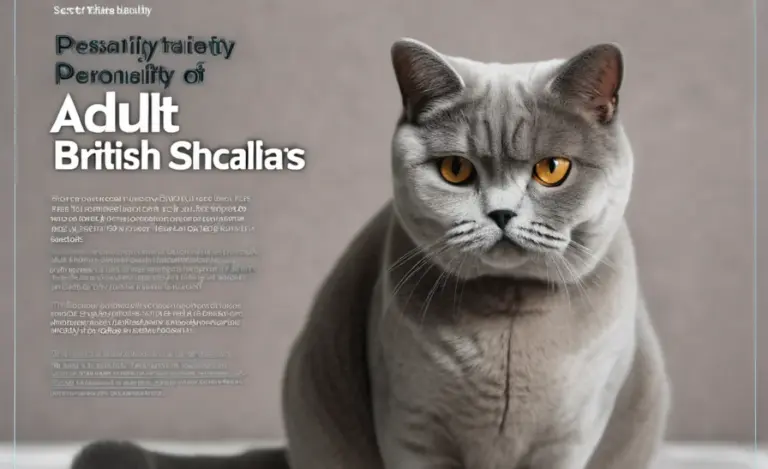Are British Shorthairs Quiet Indoor Cats? Find Out!
Are British Shorthairs quiet indoor cats? Yes, generally! British Shorthairs are known for their calm and gentle nature, making them ideal indoor companions. While they aren’t completely silent, they’re less vocal than many other breeds. Their quiet demeanor, combined with their affectionate personalities, makes them a perfect fit for apartment living and for owners who appreciate a serene home environment.
Do you dream of a furry friend who’s more cuddly companion than chatty Cathy? Perhaps you’re drawn to the plush beauty of the British Shorthair. You’re likely wondering if their reputation as quiet cats is true. It’s a common question! Many people seek a calm feline friend, especially for apartment life or peaceful households.
The good news is that British Shorthairs are generally known for their quiet nature. In this guide, we’ll explore just how quiet they are, what might cause them to be more vocal, and how to create a purr-fectly peaceful environment for your British Shorthair. Let’s dive in and discover what makes these cats such wonderful, quiet companions!
Understanding the British Shorthair Temperament
The British Shorthair’s temperament is a huge part of what makes them such popular pets. They are known for being:
- Calm and Relaxed: They aren’t usually bouncing off the walls.
- Affectionate: They enjoy being around their humans.
- Independent: They don’t constantly demand attention.
These traits contribute to their quiet nature. They’re not as prone to the attention-seeking behaviors that can lead to excessive meowing.
Why Are They Typically Quiet?
Several factors contribute to the British Shorthair’s quiet nature:
- Selective Breeding: Breeders have focused on a calm and gentle temperament.
- Laid-back Personality: They’re simply not a high-strung breed.
- Contentment: They are usually happy with a comfortable environment, food, and affection.
It’s important to remember that every cat is an individual. While the breed is known for being quiet, some British Shorthairs might be more vocal than others.
Comparing British Shorthairs to Other Breeds
To truly appreciate how quiet British Shorthairs are, let’s compare them to some other popular breeds:
| Breed | Vocalization Level | Typical Temperament |
|---|---|---|
| British Shorthair | Low to Moderate | Calm, affectionate, independent |
| Siamese | High | Very vocal, social, demanding |
| Bengal | Moderate to High | Active, playful, can be vocal |
| Persian | Low | Sweet, gentle, quiet |
| Maine Coon | Moderate | Friendly, playful, adaptable |
As you can see, breeds like Siamese are known for being very vocal, while British Shorthairs fall on the quieter end of the spectrum, similar to Persians.
When Might a British Shorthair Be More Vocal?
Even though British Shorthairs are generally quiet, there are situations where they might become more vocal. Understanding these reasons can help you address any concerns and ensure your cat’s well-being.
Common Reasons for Increased Vocalization
- Hunger: Your cat might meow to let you know it’s mealtime.
- Attention-Seeking: They might want to play or cuddle.
- Health Issues: Increased vocalization can sometimes signal pain or discomfort (Cornell Feline Health Center).
- Boredom: A lack of stimulation can lead to attention-seeking meows.
- Loneliness: If left alone for long periods, they might meow out of loneliness.
- Changes in Environment: New pets, moving, or loud noises can cause stress and vocalization.
- Age-Related Changes: Cognitive dysfunction in older cats can sometimes lead to increased vocalization.
Ruling Out Medical Issues
If your British Shorthair suddenly becomes more vocal, it’s essential to rule out any underlying medical causes. Schedule a visit with your veterinarian to discuss the changes in behavior. The vet can perform a physical exam and run tests to identify any potential health problems (RSPCA). Some conditions that can cause increased vocalization include:
- Hyperthyroidism
- Kidney disease
- Arthritis
- Dental problems
Addressing any medical issues promptly can often resolve the increased vocalization.
Creating a Quiet and Happy Environment
Even though British Shorthairs are naturally quiet, you can further enhance their well-being by creating a peaceful and stimulating environment. A happy cat is often a quiet cat!
Essential Elements for a Calm Cat
- Comfortable Bed: Provide a cozy and safe space for your cat to relax.
- Scratching Post: This helps them exercise their natural instincts and keeps them from scratching furniture.
- Interactive Toys: Engage their minds and prevent boredom.
- Clean Litter Box: A clean litter box is essential for their comfort and hygiene.
- Fresh Water: Always provide fresh, clean water.
- High-Quality Food: A nutritious diet contributes to their overall health and happiness.
Enrichment and Playtime
While British Shorthairs aren’t as demanding as some breeds, they still need playtime and enrichment. Here are some ideas:
- Puzzle Toys: These toys challenge their minds and provide entertainment.
- Feather Wands: Engage their hunting instincts with interactive play.
- Laser Pointers: A fun way to get them moving (but don’t shine it in their eyes!).
- Window Perch: Give them a view of the outside world.
- Catnip Toys: A little catnip can go a long way in keeping them happy.
Managing Stress and Anxiety
Stress can lead to increased vocalization. Here’s how to minimize stress for your British Shorthair:
- Consistent Routine: Cats thrive on routine. Keep feeding and playtime consistent.
- Safe Spaces: Ensure they have a quiet place to retreat when they feel overwhelmed.
- Pheromone Diffusers: Products like Feliway can help create a calming environment.
- Gradual Introductions: Introduce new pets or people slowly and carefully.
Training and Communication
While British Shorthairs aren’t known for being overly vocal, you can still train them to communicate in ways that work for both of you.
Understanding Your Cat’s Meows
Pay attention to the different types of meows your cat makes. Is it a short, soft meow? A long, drawn-out meow? Understanding the context can help you decipher what they’re trying to tell you.
| Type of Meow | Possible Meaning |
|---|---|
| Short, soft meow | Greeting, acknowledgment |
| Mid-pitched meow | Attention-seeking, wanting something |
| Long, drawn-out meow | Demand, frustration |
| Loud, urgent meow | Distress, pain |
| Chirping or trilling | Excitement, hunting instinct |
Positive Reinforcement Techniques
If your cat is meowing excessively for attention, avoid rewarding the behavior. Instead, only give them attention when they are quiet. You can also use positive reinforcement to train them to be quiet. For example, if they are meowing for food, wait until they stop meowing before putting the food down.
- Ignore excessive meowing: Don’t give them attention when they are meowing for it.
- Reward quiet behavior: Give them attention and praise when they are being quiet.
- Use a clicker: Pair a clicker with a treat to mark desired behaviors.
British Shorthairs in Different Living Situations
British Shorthairs are adaptable cats that can thrive in various living situations. However, some environments are better suited to their quiet nature.
Apartment Living
British Shorthairs are excellent apartment cats because of their calm and quiet demeanor. They don’t require a lot of space and are content with indoor living. Just make sure they have enough enrichment to prevent boredom.
Homes with Children
British Shorthairs can be good family pets, but they prefer a calm and gentle environment. Teach children how to interact with the cat respectfully and provide the cat with a safe space to retreat when they need a break.
Multi-Pet Households
British Shorthairs can get along with other pets, but they prefer a calm and peaceful environment. Introduce new pets slowly and carefully and make sure each pet has its own space and resources.
British Shorthair Lifespan and Care
The average lifespan of a British Shorthair is between 12 and 15 years, but some can live even longer with proper care. Providing them with a healthy lifestyle can contribute to their overall well-being and quiet nature.
Essential Care Tips
- Regular Vet Checkups: Annual checkups can help detect and prevent health problems.
- Balanced Diet: Feed them a high-quality diet appropriate for their age and activity level.
- Grooming: Brush them regularly to prevent matting and hairballs.
- Dental Care: Regular dental cleanings can prevent dental problems.
- Exercise: Provide them with opportunities for play and exercise to keep them physically and mentally stimulated.
Addressing Age-Related Changes
As British Shorthairs age, they may experience changes in their behavior, including increased vocalization. Cognitive dysfunction, arthritis, and other age-related conditions can contribute to these changes. Work with your veterinarian to manage these conditions and provide your senior cat with the best possible care.
FAQ: Are British Shorthairs Quiet Indoor Cats?
Here are some frequently asked questions about the vocalization and behavior of British Shorthairs:
- Are British Shorthairs truly quiet cats?
- Yes, British Shorthairs are generally known for being a quiet breed. They are less vocal than many other cat breeds, which makes them great companions for apartment living and for people who enjoy a peaceful home.
- Why is my British Shorthair meowing so much all of a sudden?
- Sudden changes in vocalization can indicate a few things. Your cat might be hungry, seeking attention, or experiencing a health issue. It’s best to consult with your vet to rule out any medical problems.
- How can I keep my British Shorthair entertained indoors?
- Provide plenty of interactive toys, scratching posts, and window perches. Rotate toys regularly to keep things interesting. Playtime and mental stimulation are key to a happy, quiet cat.
- Do British Shorthairs get lonely if left alone for too long?
- Yes, like all cats, British Shorthairs can get lonely. If you’re away for extended periods, consider providing them with interactive toys or even a feline companion to keep them company.
- Are British Shorthairs good for apartment living?
- Absolutely! Their calm and quiet nature makes them ideal apartment cats. They don’t require a lot of space and are generally content with indoor living, as long as their needs are met.
- Can stress or anxiety make my British Shorthair more vocal?
- Yes, stress and anxiety can definitely lead to increased vocalization. Ensure your cat has a consistent routine, a safe space to retreat to, and consider using pheromone diffusers to create a calming environment.
- What kind of environment is best for a British Shorthair?
- British Shorthairs thrive in calm, predictable environments. They appreciate a comfortable bed, regular feeding times, and plenty of opportunities for gentle play. Minimize loud noises and sudden changes to keep them feeling secure and content.
Conclusion
So, {Are British Shorthairs quiet indoor cats?} The answer is a resounding yes, for the most part! Their calm and gentle nature makes them wonderful companions for those seeking a peaceful home. While they might have their moments of vocalization, understanding their needs, providing a stimulating environment, and addressing any potential health issues can help ensure a happy and quiet life together. With a little love and care, your British Shorthair will bring years of quiet companionship and joy to your home.





